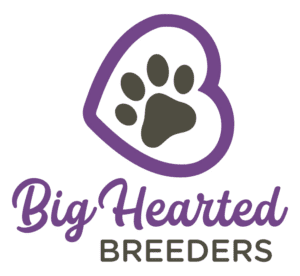Puppy Training Packages
Welcoming a new puppy into your family is an exciting experience, but it also comes with its share of challenges. At Big Hearted Breeders, we believe that every puppy deserves a strong start and every family deserves the tools to nurture a well-behaved, happy companion. That’s why we offer tailored puppy training packages designed to meet your specific needs and make the transition smoother for both you and your new furry friend.
Our training philosophy is rooted in kindness, patience, and understanding—building a foundation of trust and positive reinforcement. Whether you’re looking for help with basic manners, socialization, or more advanced training, we’re here to support you and your puppy every step of the way.
What Makes Our Training Special?
- Positive Reinforcement Methods: We focus on reward-based techniques that encourage your puppy to learn in a fun, stress-free environment.
- Customized for Every Puppy: Every puppy has their own personality, pace, and needs, and our training programs embrace that uniqueness.
- Experienced Trainers: We’re passionate about helping puppies thrive and equipping families with lifelong skills to nurture a well-mannered companion.
- Seamless Transition: Whether your puppy is just starting their training journey or continuing their learning, we’ll ensure they feel supported and confident every step of the way.
Training isn’t just about teaching commands—it’s about building a bond of trust and communication that lasts a lifetime. Let Big Hearted Breeders help you and your puppy create a partnership based on love, respect, and understanding.
We’re excited to work with you and your pup to build a happy, harmonious future together. Explore our training options to find the perfect fit for your growing family!
Training Tips To Help Your Puppy
Manners
- Biting and Nipping: Redirect playful biting to toys and reinforce gentle behavior (“gentle” or “easy” commands).
- Appropriate Chewing: Provide safe chew toys to prevent furniture or shoe destruction.
Play and Enrichment
- Toys and Games: Use toys to encourage problem-solving and healthy play habits. Simple retrieving games can be introduced if the puppy shows interest.
- Social Play: Monitor playtime with other puppies or dogs to ensure appropriate behavior and self-control.
Crate Training
- Comfort in Crate: The puppy should be learning to settle in the crate for short periods and during the night. Gradually increase crate time with positive reinforcement.
Behavior Expectations
- Short Attention Span: Puppies at this age can focus for only 5–10 minutes. Training should be frequent but brief.
- Energy Levels: Be prepared for bursts of energy followed by naps. Structure playtime and provide ample rest.
Keep sessions positive and short, using treats, toys, and praise to reward good behavior. Look for the Win!
Avoid harsh corrections—redirect mistakes gently.
Be consistent with rules and routines to help the puppy learn faster.
Age appropriate Advanced Training
- learning a strong stay
- learning a strong place
- learning how to retrieve an item
- learning to recall in a highly stimulating environment like a park ****must have a solid recall in the home where they come 100% of the time they are called when in your home***
- structured heel

